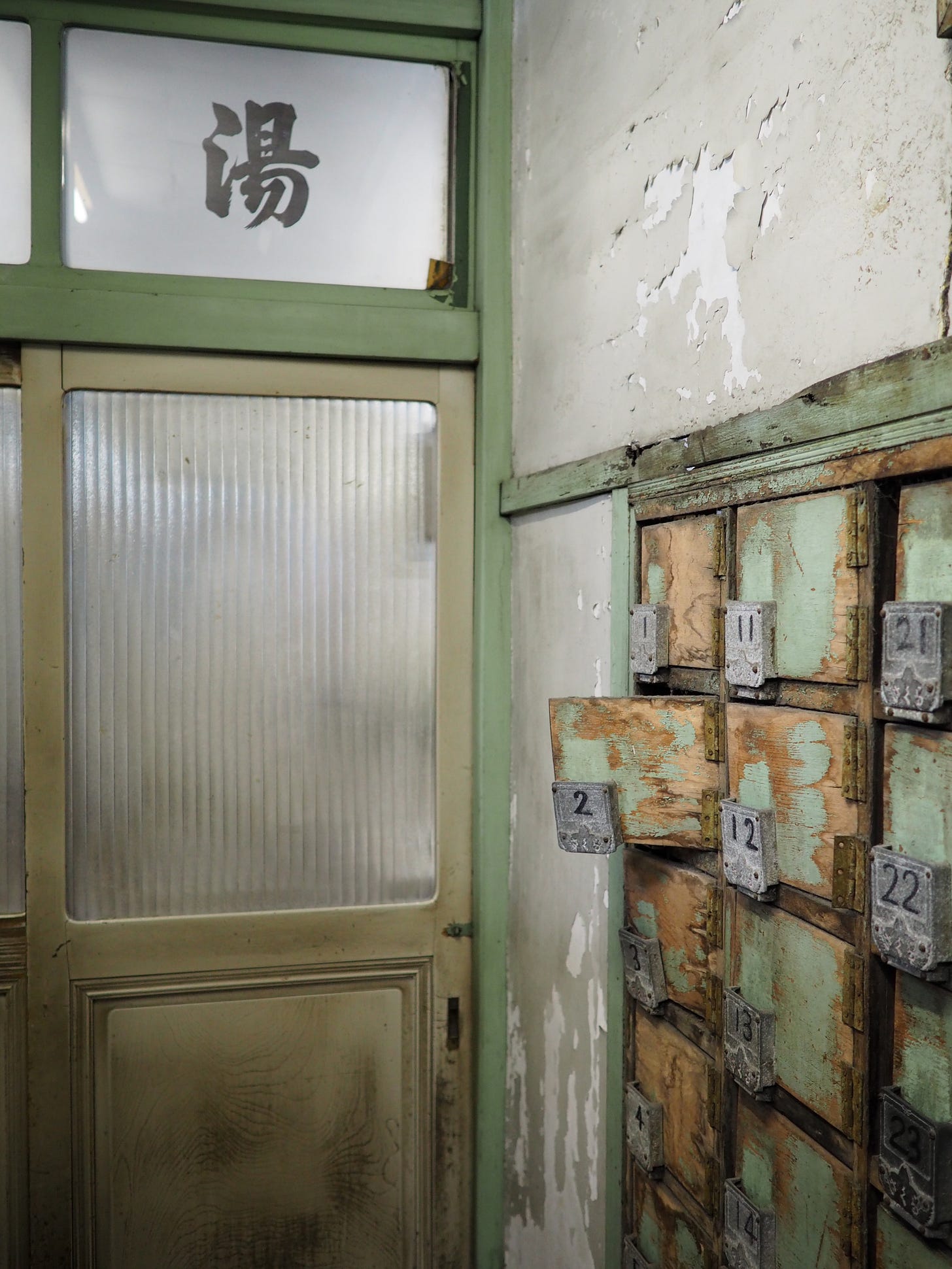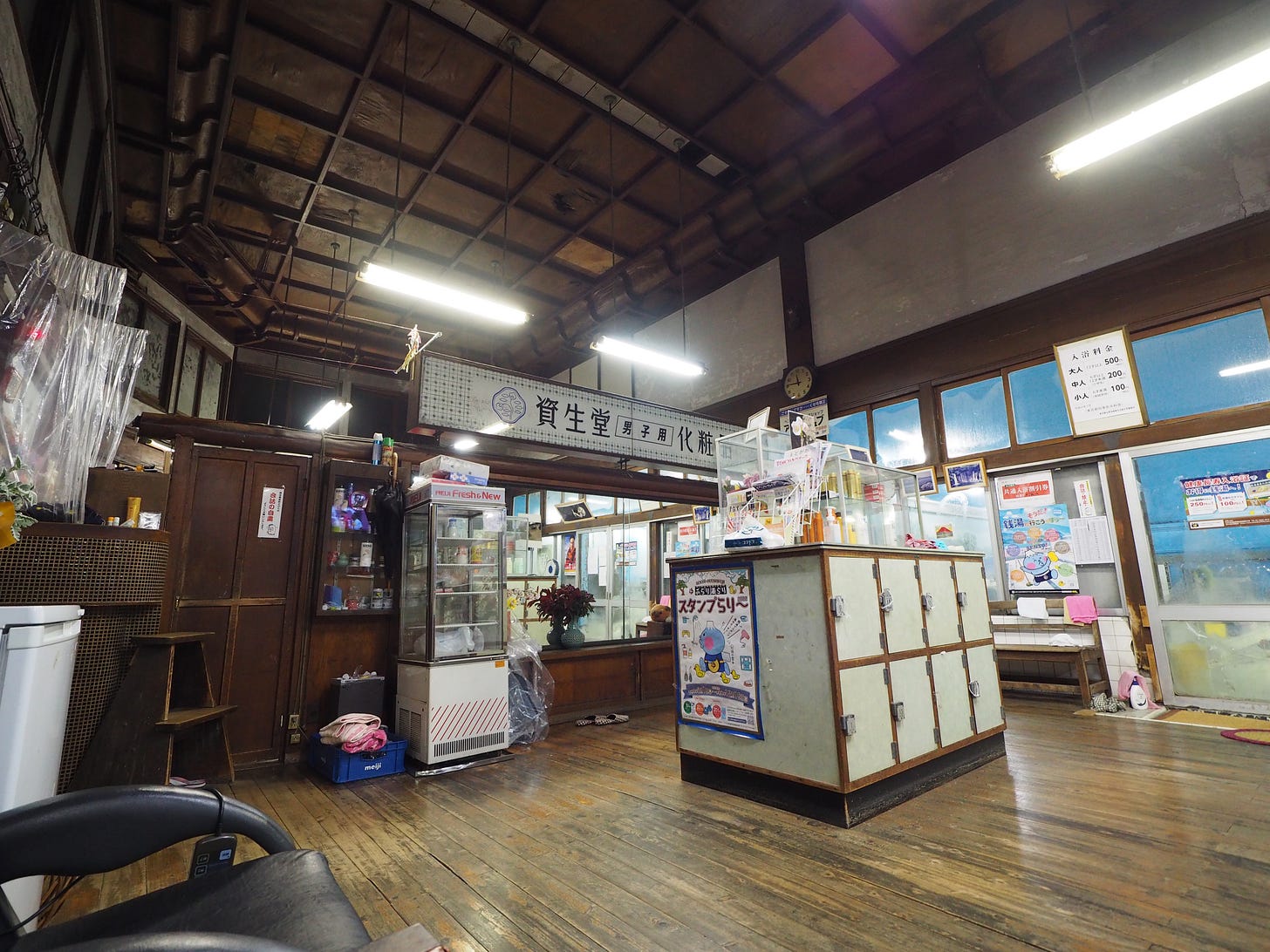A retro bath meets its end
Soaking in a particular place in space and time
Often when a bath I’ve never seen closes in some distant corner of Tokyo, I hear of it after its already gone, in the form of forlorn Twitter posts, or ripples of nostalgia through different sento fan communities. Occasionally intel arrives in advance, like from the lips of a young sento owner earlier this month, who spoke glowingly of a real retro treasure in the eastern reaches of Tokyo—a place truly on its last legs but oh man, it has character. Closes on the 26th. In the busyness of life, the days slipped away before I realized, until at seven p.m. on the 26th a message came in from one of my colleagues. It’s as awesome as they say, a beautifully built Tokyo sento with all the original finishes, but sort of like taking a bath in a ruin. At nine, a message arrived from another colleague, this time with a photo of a crying grandma in the entryway, carrying home a jumbo Mickey plush from the dressing room. I was already exhausted by the time I noticed at ten. The bath closed at midnight, an hour’s train ride away. I showed my wife the messages. You’ll regret it if we don’t go, she said.
We commandeered a taxi and were off, coasting through the hills toward Nippori, criss-crossing the lowlands of Arakawa, sailing down the river embankment beside the apartment towers at Senju before crossing the Sumida, then still further across the Arakawa, the Naka, the Shin-Naka, fifteen kilometers of hopscotch through the Tokyo maze to Edogawa, and a small street south of Koiwa Station. Time compressed just enough to experience a place in one moment before it disappears in the next. We walked up to the bathhouse at 11:03.
White light spilled into the street from the modest entryway, just a roofed area for customers to park their bicycles and mopeds between a pair of vending machines. It sat between the orange awning of a cosmetics shop and a hand-painted sign for the neighboring auto shop that looked like its been around since the 1950s, written in old kanji with a seven-digit phone number. I peered into the laundromat to the right of the entry, where washer drums whirred beneath an ancient television tucked onto a corner shelf. The first sign of ruination appeared in the atrium, where men and women separate into their respective dressing rooms and the shoe lockers had begun to succumb to water damage from a hole in the ceiling.
I slid the door open and walked into a different world. A big dressing room, bigger than usual, with a tall coffered ceiling, and an elderly woman taking coins and disbursing soap from her high bandai desk. Ten guys stood around in different states of undress or lounged on the cluster of sofas in the corner. It was perfect—so perfectly untouched, from the original painted advertisements to the old massage chair and the etched koi fish patterns on the glass doors, yet also so perfectly touched, used, like wandering into a communal living room where everyone feels at home. The only thing that suggested we were still in the present was a small LED television atop the lockers, where Qatar and Senegal were kicking a ball around the Arabian desert.
There’s a word we sometimes use in Japanese to describe places seemingly left behind by time, the basuekan, the vibe of “a place at the end,” so far on the edge of town that the only folks who wander in are the regulars who don’t mind that some of the fluorescent lights are out, or the dust caked on the propellor ceiling fan, or the mushy feel of the wood floors sitting atop rotted joists; where deferred maintenance cries out from every corner but you can only feel thankful to the people who run it because they’re still somehow miraculously hanging on. I live to stumble into such places.
I stripped down and grabbed my towel and headed for the baths when a man intercepted me. Excuse me, do you have a laser? he asked in English. I’m sorry? He held up a packaged disposable razor. My present to you. Thanks. Wasn’t planning on shaving but why not. I stepped in and grabbed a bucket and a small green chair. The tile floor of the bathroom has cracked and shifted and been re-mortared so many times that it feels underfoot like walking on the beach. There were 36 washing stations, arranged on both sides of two central banks extending perpendicular from the back wall where the baths are, and along the two outer walls. The lanes in between are at least two meters wide, where eager bathers once queued to get their turn at the faucets.
As I filled my bucket with hot water, shaved, and scrubbed, a blizzard of Christmas tunes echoed from somewhere deeper in the space, even though it was still late November. Jingle Bells, Joy to the World, Let It Snow. It was as if they were rushing through the calendar on fast-forward, trying to reach the new year before the clock struck midnight. Feeling enchanted, I settled into the deep end of the bath, next to a statue of Venus perched atop the rim. The tiles of the bath were exquisitely discolored in a rusty reddish-brown hue. From this position I could take in the whole space and absorb for a few minutes the color of the light, the heat, the sounds, let my body soak up some of the irreplicable aura of a particular place in time and space. Over on the women’s side, I could see a hole opening up in the ceiling, and a panel of the wall peeling off. Here, the place really was at the end of its time. The ba was finally meeting its sue.
A man slid into the water next to me. Did you come here a lot? he asked. No, first time, I just hopped a taxi across town to get here, but I’m in awe of the space. Not so many that are this big, this old in Tokyo. Oh yes, it’s very nice. Have you been to many other baths? About 200, probably. Oh wow, you know very well then, you must have many stamps then. Actually, I don’t collect the stamps from the bathhouses. Oh what a shame, but you must! He was a bath maniac, the sort of guy who travels the country and visits every sento on the map. What about you? I ask. He leaned back and looked up at the ceiling with a satisfied smile, Oh yes, I’ve been everywhere from Hokkaido to Kyushu. Some of the baths in Hokkaido are ever so hard to get to. He was a balding man with a warm smile and a bushy, full beard. As O Tannenbaum reverberated through the tinny speakers for the third time, it seemed plausible that I may have been spirited away to another reality, where this bathhouse Santa sleighs around and slips down the tall chimneys to say farewell.
By 11:45, I was back out in the dressing room. As the final minutes ticked away, the grandmother shuffled about picking things up, stripping labels off bottles, wiping up puddles, going through the daily motions one last time. Just when she had hoisted herself back up to her tall desk, a younger guy, speaking like a grandson but perhaps just a regular, came out naked and called to her. “Hey, are you trying to make it lukewarm, cuz it certainly ain’t hot!”
“Oh darn it, why doesn’t anybody tell me!” she cried, rolling out of her chair and scurrying through the women’s side back to the boiler room, twisting the dials to keep the baths warm for the 15 final minutes of a 70-year run.
When she returned, I bought the last bottle of milk out of the glass fridge and told her it was a wonderful bath. Thank you but oh how can you say that when it was so lukewarm, oh I’m so embarrassed. Not a problem, it was just right. Thank you for keeping it warm for all these years. Thank you so much. Please be healthy. Please be happy. Please do great things in the world. I stepped out to the entry to meet my companion and we wandered into the early morning darkness, towards the station and home.








